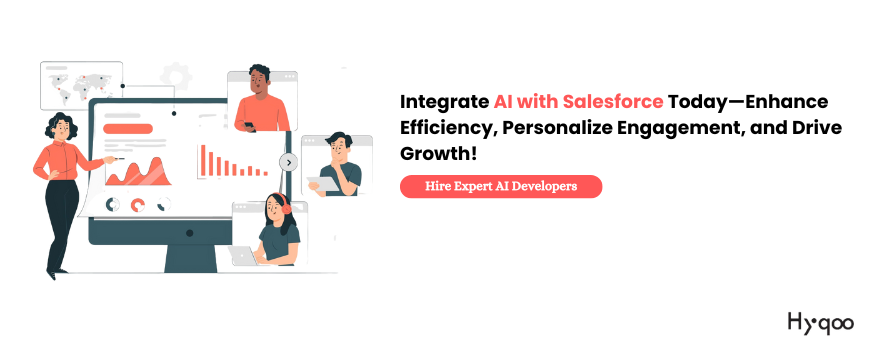7 Mins
7 Mins
Did you know that businesses using AI in Customer Relationship Management show a whopping 25% boost in customer satisfaction? Harnessing AI (Artificial Intelligence) has become a necessity, and Salesforce has begun to set new standards by seamlessly integrating AI into its operations.
Salesforce development is currently making headlines as a powerful CRM system that helps businesses with proper account planning, effective campaign administration, and enabling first-rate customer services. Therefore, your business will have better productivity and improved client satisfaction.
This is where Salesforce and AI integration come into the picture! AI in Salesforce presents a potential leap forward in many aspects of your business, offering unprecedented capabilities to acquire greater insights into data, optimize routine tasks, and aid in better cost savings. Let’s learn how AI in Salesforce development transforms businesses to thrive in today’s data-driven world.
Einstein AI, Salesforce’s flagship AI platform, was built to supercharge businesses by integrating AI into the core of their operations. It provides AI-driven insights, automation, and recommendations directly within the Salesforce platform.
Unlike the conventional AI solutions that demand complex coding skills or expertise in data science, Einstein AI is designed to be user-friendly, which makes it accessible for modern business users who even lack technical backgrounds. Whether your business wants to streamline its sales pipelines or optimize marketing campaigns, AI in Salesforce will empower you with actionable insights.
The rising market demand and evolution in technology have converged to shape the evolution of Salesforce development from a cloud-based system into a holistic, AI-driven business platform. With natural language (NLP) and deep learning ability, Salesforce’s AI features analyze the action of its substantial user base to continue to enhance its capabilities and provide you with more accurate assessments as it learns. Here are some of the effective ways in which AI in Salesforce assists your business to flourish.
The biggest transformation that Salesforce AI brings to your business operations is through its predictive analysis in forecasting future trends. Historical data will aid the AI algorithms in identifying patterns and trends that will result in better decisions. Salesforce Einstein sets a perfect example of how intelligent sales can benefit the business.
The platform leverages Machine Learning (ML) to predict the leads that are likely to transform into paying customers. With this insight, your sales team will be able to prioritize the high-potential leads, improving conversion rates.
A CRM system’s primary goal is to facilitate better relationships between businesses and their clients. Salesforce’s AI-powered tools elevate this goal by delivering hyper-personalized customer experiences. Empowered with machine learning, Salesforce Einstein generates product recommendations for your customers based on their behaviour, preferences, and purchasing histories.
Moreover, AI integration in Salesforce allows Customer Support teams to design solutions that make better recommendations to address their concerns. As a result, your customers will have an engaging and personal experience, achieving brand loyalty and customer retention.
Automation in Salesforce development is the key driver of innovation, where your business can automate the repetitive tasks that take up plenty of time. Some prominent features that you can use to automate customer interactions and internal workflows are Einstein Bots and Einstein’s voice.
Einstein bots will answer Customer Service questions like assessing order status, resetting passwords, or answering any Frequently Asked Questions (FAQs). They will help you achieve better response times and improved customer satisfaction with reduced operations costs. Nonetheless, they will free up your customer service team to deal with complex, core issues.
Einstein Voice will enable your customers to update records, set reminders, and gain insights. It can be a handy tool for sales teams and service professionals who want to stay productive outside of office hours.
Be it Sales and Marketing or Customer Service, the challenge for businesses to integrate such disparate data into a unified, 360-degree view has multi-folded. To overcome this challenge, AI integration in Salesforce will enable cross-consolation by cutting down Data Silos.
For instance, Einstein analytics will give your business real-time, actionable insights from raw data through intuitive dashboards. Its ability to gather data from every possible touchpoint will drive innovation across all departments. By understanding customers, sales trends, and marketing preferences, your business can identify new opportunities to improve your strategy and stay ahead of the competition.
Salesforce professionals have strived to design, deploy, and manage several special solutions within their ecosystem for modern business. However, the emergence of AI has drastically transformed the role of those professionals. With AI technologies like machine learning (ML) and natural language processing (NLP), developers can now build intelligent and predictive apps. Here’s how AI evolves your role as a developer.
As a developer in today’s digital age, you must learn to embrace a diverse skill set that includes traditional programming and AI technology modules. As a result, you will learn about AI algorithms and data modelling and how to use the Salesforce Einstein AI platform. It will improve your expertise and enable you to design more efficient business solutions.
AI Integration in Salesforce streamlines business development operations by automating repetitive tasks like data entry and report generation. This allows developers to focus on more complex and strategic aspects of those projects.
A developer must acquire important insights into client behavior, customer preference, and recent market trends. AI in Salesforce allows you to make data-driven decisions and aids in the accurate estimation of future demands. It ensures that resources are being employed effectively, lowering costs and improving outcomes.
AI-powered automation and customization features improve customer interactions in Salesforce. From automated assistance operations to personalized recommendations, AI technologies in the platforms will allow Salesforce talent to deliver a whole new customer experience by empowering satisfied connections.
With AI integration in Salesforce, developers can continuously improve their solutions by analyzing performance metrics and user feedback in real-time. Such a proactive approach in Salesforce development will enable faster iterations, guaranteeing that programs will adapt to evolving customer expectations and demands of modern business.
Apart from Salesforce’s own AI offerings, developers will also have access to a broad range of third-party AI tools and services, which complement the Salesforce development, chatbots, analytics platforms, and sentiment analysis tools. These modules can be readily integrated with the Salesforce ecosystem to promote its functionality.
As we embrace AI’s role in the future growth of Salesforce development, the prospects and creative potential of the integration are limitless. AI will continue to empower developers by providing them with reliable tools and resources to build smarter and more efficient solutions that fit the changing demands of both businesses and customers.
At Hyqoo, we help you Hire a Salesforce developer by tapping into the global pool of diverse, pre-vetted talents, ensuring your business always stays at the forefront of innovation. With the power of Artificial Intelligence, we reshape your hiring module and enable you to secure the best team available. By partnering with Hyqoo, you are paving the way for a successful business in the AI-driven future. 
Share Article
Subscribe and get fresh content delivered right to your inbox

9 Mins
AI-driven hyper-personalization is reshaping retail by turning every customer interaction into a meaningful, data-powered moment. This blog explores how retailers can move beyond generic marketing to deliver truly individualized experiences that drive conversions, loyalty, and long-term ROI. Learn how embracing AI can help you anticipate customer needs, create emotional engagement, and elevate every step of the shopping journey.
Continue Reading

7 Mins
Building AI agents that truly make an impact isn’t about bigger models or faster code; it’s about purpose, design, and learning. In this blog, we follow the data scientist’s journey to create intelligent systems that adapt on their own, make smarter decisions, and scale with confidence. It’s a story of how AI becomes more than automation; it becomes transformation.
Continue Reading

11 Mins
Low-code and no-code AI tools are transforming how organizations innovate. Instead of relying solely on large engineering teams, companies are now empowering business users and domain experts to build AI-driven applications through visual interfaces and prebuilt models. This blog explores how enterprises are adopting these tools, the benefits and risks involved, and why pairing them with expert AI talent, through platforms like Hyqoo, ensures quality, governance, and long-term scalability.
Continue Reading
Subscribe and get fresh content delivered right to your inbox
Prompt Engineer
AI Product Manager
Generative AI Engineer
AI Integration Specialist
Data Privacy Consultant
AI Security Specialist
AI Auditor
Machine Managers
AI Ethicist
Generative AI Safety Engineer
Generative AI Architect
Data Annotator
AI QA Specialists
Data Architect
Data Engineer
Data Modeler
Data Visualization Analyst
Data QA
Data Analyst
Data Scientist
Data Governance
Database Operations
Front-End Engineer
Backend Engineer
Full Stack Engineer
QA Engineer
DevOps Engineer
Mobile App Developer
Software Architect
Project Manager
Scrum Master
Cloud Platform Architect
Cloud Platform Engineer
Cloud Software Engineer
Cloud Data Engineer
System Administrator
Cloud DevOps Engineer
Site Reliability Engineer
Product Manager
Business Analyst
Technical Product Manager
UI UX Designer
UI UX Developer
Application Security Engineer
Security Engineer
Network Security Engineer
Information Security Analyst
IT Security Specialist
Cybersecurity Analyst
Security System Administrator
Penetration Tester
IT Control Specialist